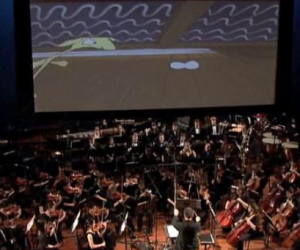 Many film composers learn their trade by scoring short films. Many continue to score short films, and many never get an opportunity to score a full feature. The truth is that there are many challenges with a short – how do you get coherent themes into so few cues, for example, and how do you establish a style in a short piece? Equally, can you impress the audience and bring something to the film?
Many film composers learn their trade by scoring short films. Many continue to score short films, and many never get an opportunity to score a full feature. The truth is that there are many challenges with a short – how do you get coherent themes into so few cues, for example, and how do you establish a style in a short piece? Equally, can you impress the audience and bring something to the film?
I’ve been commissioned to provide music for a short film for a director I’ve worked with before, Dave Maybrick. The film is a short drama about a meeting between a retired soap actress and a fan. There’s some guide music the editor has used in the edit I have, by William Walton and Claude Debussy. Dave really likes the music that the edit contained. This comes up quite often – it makes the edit look more real, and editors often like to cut the picture to music.
A director often likes the guide track so much they want to keep it, or, if it’s not available to license within their budget, they want something very similar. Keeping it is OK although I’d argue that in a drama it’s better to have bespoke music without any other associations unless, of course, you want to be making those associations (time passing in Goodfellas, for example). Replacing it with something similar is potentially a lose/lose negotiation – the composer isn’t satisfied because the final cue is too close to the guide track, and the director isn’t satisfied because the cue isn’t close enough! But my advice is don’t get obsessed about it; it’s probably just one cue!
What you can take is a big pointer towards instrumentation and style, though – the clip of William Walton is a string section, and the Debussy is piano, so that’s where we’re headed with this score.
We also need a theme for the Jubilee Road soap opera, so the first stop is research around TV themes from the 1960s. Mostly these are very cheerful, but I want to capture a bit of grayness. There was a lot of muted trumpet in that decade! That’s all a bit too dramatic, so I settle on a harmonica – that seems to work.
As I worked on this, I also decided that Dave might need a sting in this style – the cut into a commercial break always has a little reprise, and I’ve decided that a commercial station would have broadcast Jubilee Road.
Most of my early sketches are piano with strings or solo piano, although I have thrown in some other arrangements just in case I misread the signs around Walton and Debussy. The string cues, where the guide was William Walton, are easier for me – the Walton arrangements are very beautiful in their simplicity, so I’ve used a chord sequence that we can re-use in other cues – I’m keen to hold all the cues together somehow.
I sit at the piano working on something else, and a little figure comes to me that might work for the bus scene. I record it and arrange some strings over it and send it to Dave, who likes it, but wants to use a section of it for C3, the closing scene. This is also a good sign that all the cues in a film feel related and fit together.
In the final mix, we used my strings and piano for the opening; my Jubilee Road theme and sting; my piano piece for the scene in the corridor; Debussy for the bus scene; and my strings and piano for the closing. I feel like the music holds together as being parts of a whole, and I’m happy that I gave the director what he wanted. You can listen to all of the music including the sketches at www.kimhalliday.com/lookingforvi and let me know what you think…
ABOUT THE AUTHOR
KIM HALLIDAY is a composer and musician working in London. He began playing the violin at age 7, took up the guitar and dropped the violin (although he kept the bow) at 13, and spent his early teens trying to become Jimmy Page. Rescued from a life in prog rock by Dr Feelgood, and after several years of punk, new wave, psychobilly and ska, Kim decided that life in a sweaty van with three blokes he hated wasn’t a sensible career goal, and he signed up to the London International Film School to learn how to write music to picture. While there he scored several prize-winning shorts. He has written and played scores for feature films, (Credo, Pink Pumpkins at Dawn), documentaries (Freedom for Birth, Doulah!, Real Birth Stories), commercial video and theatre. His music is designed to comfort and disturb in equal measure, and his latest release, Birdsong In Mist, is available on Ravello Records.
